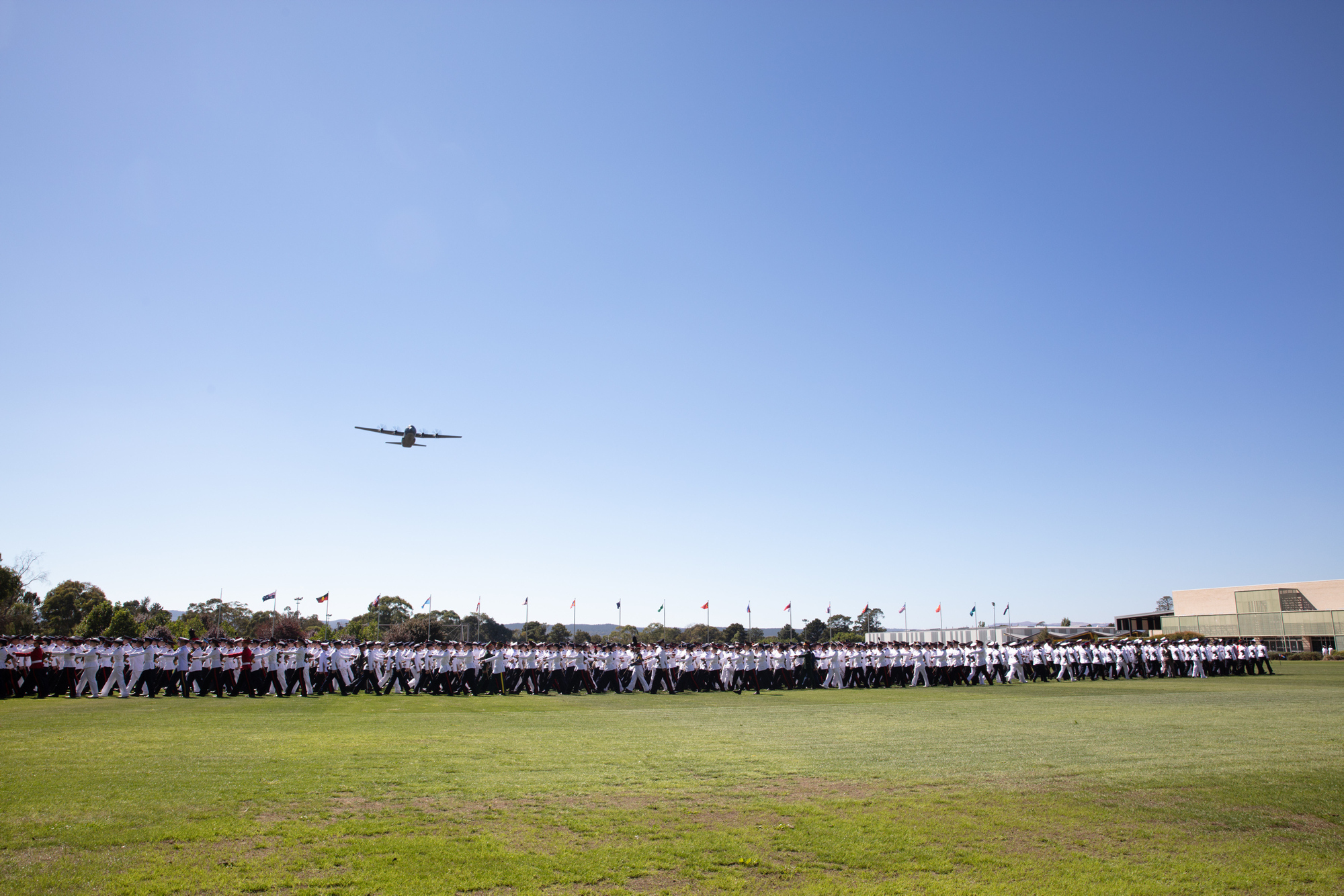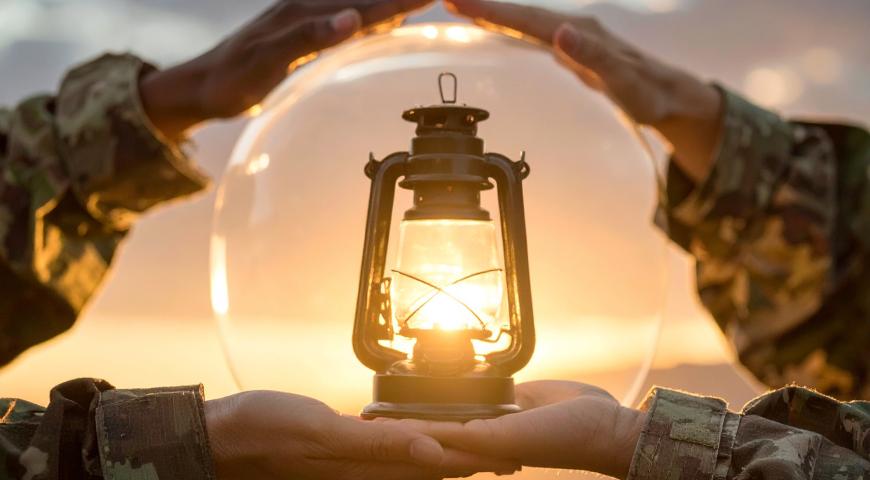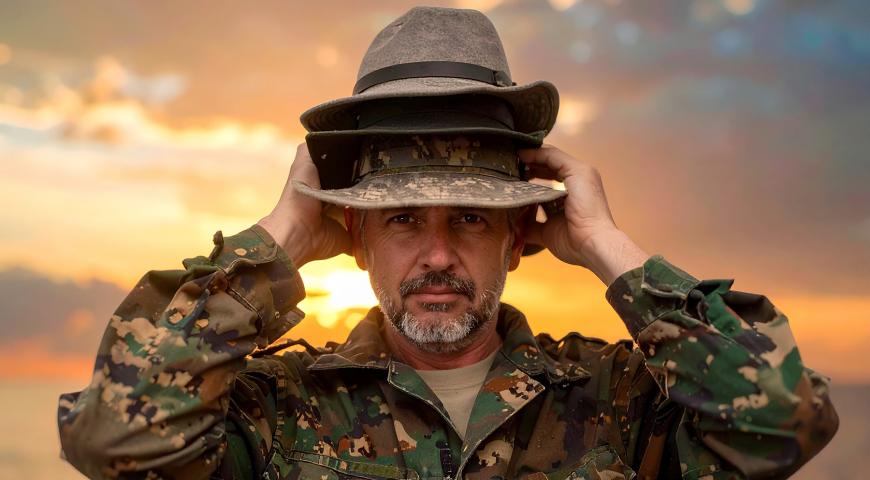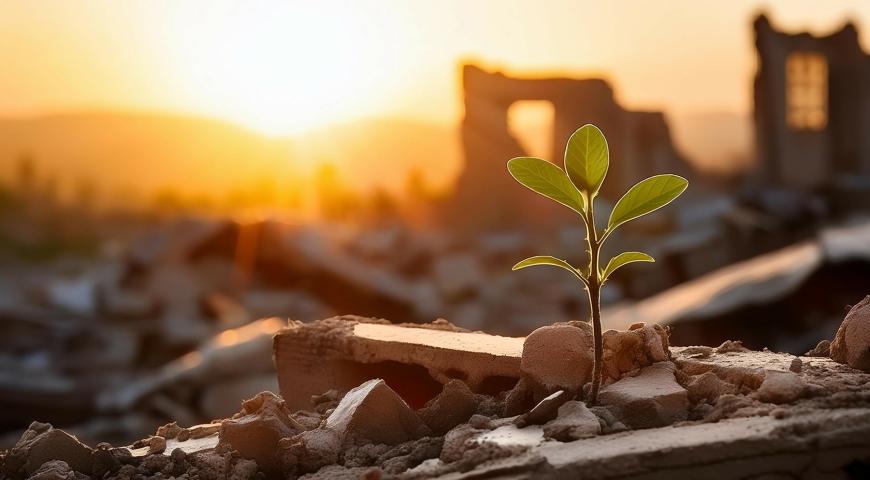PROFESSOR MICHAEL EVANS
HASSETT CHAIR OF MILITARY STUDIES
When I informed my daughter that I was to speak to 300 ADFA cadets on the subject of resilience, she said to me:” ‘Don’t do it. They will see you as a dinosaur’. To which I replied, ‘well, dinosaurs ruled the earth for millions of years before becoming extinct, so they must have known something of value’.
So tonight, as Professorsaurus rex, I will try to outline the ‘something of value’ that I know about resilience and its place in the profession of arms. I hope my words may be of use to you as you embark upon your careers as officer cadets in the ADF.
By philosophical inclination I am a Stoic. Indeed, I would describe myself as a Christian Stoic and I have written and spoken on Stoicism both here and overseas to audiences such as the SAS Regiment, the 2nd Commando Regiment and the US Marine Corps. Tonight, it is not my intention to discuss Stoicism in detail or directly – even though I am inclined to believe it is the most appropriate philosophy for those among you who seek to embrace a warrior ethos – an ethos that looks into the abyss of war with an eagle’s eyes and enters it with an eagle’s talons.
Instead my intention is to talk more broadly about the profession of arms and how it must cultivate a mindset of resilience in its members. Nowadays, resilience is a serious challenge inside the ADF. We spend much time and money arming our military personnel for the physical rigour of operations and we do this well. But we provide less emphasis on providing inner armament for mind and soul - what I call the ‘psychic economy’ of the military professional. Yet, it is possession of a psychic economy that provides both the spiritual and mental protection necessary for military professionals to cultivate individual and unit resilience.
When it comes to building resilience in the Australian profession of arms our challenge is crystal clear: we must prepare the soldier for the road, not the road for the soldier. For those people who see the military profession as just another job or a temporary ‘lifestyle choice’ this is an uncomfortable message.
The truth is that the profession of arms is not just an occupation; it is rather a unique calling. I cannot improve on what the military historian Walter Millis wrote in the early 1960s:
Military service stands by itself. It has some of the qualities of a priesthood, of a professional civil servant, of a great bureaucratic business organisation and of an academic order. It has something of each of these but it corresponds to exactly none. It is set apart therefore from those who have followed other walks of life.
We must understand the uniqueness of the military profession if we want to have effective armed forces as the guardians of our democratic freedoms.
Because the military is unique, the road we prepare its members to travel is lonely, long and desolate and it has a deadly destination namely warfighting. The ultimate purpose of any professional fighting force is the application of violence by mastery of arms and it is for the ‘road of warfighting’ that we train and educate you for no one else in our society is invested with this legal responsibility. Indeed, it is a sacred trust, for you, and no one else but you, must perform this mission with skill, dedication and determination.
The military road on which you will embark after being commissioned stretches forward into an unknown future and the journey will test your capacity for endurance. You will encounter the dark and bloody crossroads where heroism and heartache meet; endure the slings of adversity and the joys of success; and you will confront the heights of triumph and also the lows of tragedy. Some of you will be touched by fire and all here will learn that living is a ‘vale of soul-making’. And many of you will discover that if you are to succeed as a military officer you must pass through the rites of experience for as the poet Robert Frost tells us, ‘the only way around is through’.
What will be your compass on this twisting highway toward a rendezvous with warfighting? Above all else, your journey will require you to adopt a compass drawn from moral philosophy. A moral philosophy will allow you to hone a virtuous character like a whetstone sharpens the edge of a sword. And what, you may well ask, is virtuous character in an era defined by celebrity, crude social media and a coarse popular taste?
Well, character is not the same as personality – character is developed from within; it is what you are in the dark, when you face yourself alone. Personality is developed without; it is what you are in the light for all to see. Moral philosophy is concerned with the values of character not the shades of personality – for it is character that forges an inner resilience.
All of you here tonight have made a willing and deliberate choice to join the Australian profession of arms and to embrace its call to service. This choice requires you to accept the two great pillars of service: namely, public duty (a contract with the state) and private excellence (a covenant with character) and to give the qualities of both to a military profession steeped in historical tradition. All of you here tonight are descended from the ancient Greek phalanxes through the Roman Legions to the Rats of Tobruk and the Diggers of Long Tan and Uruzgan. And like the crusading knight in Ingmar Bergman’s classic film, The Seventh Seal, you must learn the spirit of perseverance and be prepared for a lifelong stalking game against the soldier’s mortal enemy: the Angel of Death whose presence haunts all battlefields.
A professional military is about the summons of service and, contrary to popular belief, a military career is less about the taking of life than about the principle of self-sacrifice and the need for comradeship in the crucible of combat. As William Pfaff writes in his book The Bullet’s Song:
The soldier’s lot is inherently and voluntarily a tragic role, an undertaking to offer one’s life, to assume the right to take the lives of others. The intelligent soldier recognises that the two undertakings are connected. His warrant to kill is integrally related to his willingness to die.
Because the test of combat places such intense demands on the psychic economy of uniformed professionals, the armed services must strive to be a shield of grace and reflect the highest values in human nature.
It is then, the embrace of the selfless values of service that define the profession of arms. The German philosopher Immanuel Kant might have had the armed services in mind when he wrote: ‘The highest reason for living is to seek to act from a sense of righteous duty – to follow something greater than oneself and to discover how to serve’. The world of military service is the polar opposite of so much of our contemporary society which is dominated by the’ moral deskilling’ of individuals through the cult of narcissism and the promotion of victimhood over empowerment. Ours is an age of syndromes, traumas, disorders and addictions – some of which proliferate as alibis for any number of moral failures in character and abandonments of personal responsibility.
In sharp contrast, the military life calls for ‘moral skilling’ and is based on the notion that every officer is a steward of the profession, a servant not a self-server. As General Dwight Eisenhower told his combat officers on the eve of D-Day in 1944: ‘In order to fulfill yourself, you have to forget yourself. In order to find yourself you have to lose yourself’
Yet building resilience in the ADF raises many challenging questions. How can moral philosophy help us to master our thoughts, emotions and actions to allow us to function under grave stress?
It is here that we encounter the difference between a contract and a covenant. Every person who joins the military profession is required to sign a contract with, and accept a commission from, the state. This contract is called unofficially ‘the unlimited liability’. It requires all of you to agree to serve the nation as its armed guardians in full knowledge that fulfilling the terms of the contract may cost you your lives. As the great West Australian and British Army general, Sir John Hackett puts it in his 1983 book, The Profession of Arms, it is the unlimited liability that sets the soldier apart from those he or she defends. As he puts it:
The whole essence of being a soldier is not to slay but to be slain. The essential basis of the military life is the ordered application of force under an unlimited liability. It is the unlimited liability what sets the man who embraces this life somewhat apart. He will be (or should be) always a citizen. So long as he serves he will never be a civilian.
Ponder those last words: ‘so long as you serve you will never be a civilian’. This distinction is very important to understand because the military professional is in essence a ‘manager of violence’ who is licensed by the state to hold a monopoly on the means of armed force. For managers of violence, civilian ideas on what constitute resilience can have little place in a profession defined by the deadly doctrines of warfighing and of unlimited liability. In no other profession is such jurisdiction embedded into a contract of public duty.
If, then, the soldier is bound by a contract of public duty to serve society at the very risk of life, he or she must be prepared at all times for the possibility of the supreme sacrifice. It is here that the true military professional must make a private covenant to embrace a spirit of resilience in the face of danger. What do I mean by a covenant? A covenant is a vow, a moral pledge that is open-ended and long-lasting and which seldom involves any individual advantage.
A covenant is about obedience to conscience and personal rectitude that relies on an inner capacity for restraint and an attachment to integrity. In the military profession, a covenant serves to define private excellence and represents a personal embrace of the officer ethic. A covenant will guide you toward what you ought to be, what you can be and what you must be. As George C. Marshall, one of the greatest of American soldiers, advises: ‘an officer never is to take the counsel of his ambition’. This is especially so when ambition contradicts the good of those he or she commands. In this way, a contract of public duty and a covenant of private excellence merge. The institutional values of the profession of arms become a reflection of individual behaviour by practice of will and intellect, and through a meeting of heart and mind.
Developing character to serve both contract and covenant requires a steadfast spirit which must be renewed constantly as you advance in the profession. It is not an easy undertaking. We are all flawed human beings and Immanuel Kant warns us that the task of forging character always involves straightening ‘the crooked timber of humanity’.
You must understand that the world owes you nothing; there is no moral economy in our universe; the good may suffer and die young and poor; the bad may prosper and die old and rich. But the unfair whirl of the great roulette wheel of fate does not absolve us from seeking to master the contest of living with grace and dignity. Only by cultivating self-command and moral autonomy from the cardinal virtues of wisdom, courage, temperance and justice can we develop the perseverance, resolution and capacity to overcome adversity and to manage success.
Here the Stoic philosophers are insightful for they teach us about the ‘fork of life’ in which we must distinguish between the things are under our control (our beliefs, choices, desires, and aversions) and the things are not (our bodies, possessions, reputation).
The key to moral freedom and inner strength is to know this fork of life. Since we cannot control events we must learn to control ourselves. The quest to master the fork of life is an odyssey to know ourselves for as the Chinese sage, Sun Zi puts it: if you know yourselves and you know the enemy you will be victorious in a hundred battles. The poet T. S. Eliot puts it more eloquently when he says, ‘we must not cease from exploration for the end of all our exploring will be to arrive where we started and know the place for the first time’.
It is our moral decisions, not our material conditions, then, that provide us with the raw material for developing strength of character. As Weary Dunlop notes in his Diaries on the horrors being a Japanese prisoner-of-war on the Thai-Burma Death Railway, it is in serving others that we are spiritually redeemed. ‘We Are Our Brother’s Keeper’ and the ‘Power of We is always greater than the Power of One’. Life’s test, writes Dunlop, is how strong a person’s resolve is to endure life after one has lost everything outside of oneself.
Can the psychic economy of the soldier survive the strain of adversity and defeat? Those who can conserve strength of will in the most dire of circumstances against life’s Furies are never superheroes: they are always ordinary people who become exemplary through the practice of courage. We need to remember that while courage is the first of human qualities, there is a difference between physical audacity and authentic courage.
Real military courage is not Hollywood heroics, but a combination of confidence, caution and respect for comrades learned through habitual fortitude – a choice of moral behaviour in the face of fear. True courage is a fixed moral resolve not to quit; an act of renunciation which must be made not once but many times by the power of the human will.
Is there an easy formula for cultivating military resilience? No, but there are wise guidelines for fostering strong life-skills drawn from history, literature and philosophy across the ages. They are skills that the poet Emily Bronte tells us will build a ‘chainless soul’ with a mindset of freedom to endure.
Here are ten life-skills to consider that, if pursued help to make for a strong mindset and an unconquerable soul:
- Know and be true to yourself
- Understand what you can and cannot control
- Use the shortness of life to pursue virtuous conduct
- Happiness comes from a summoned self that serves a greater good
- Cultivate modesty but know your worth
- Enjoy success but see failure as a teacher
- Take praise lightly for there is no Indispensable Person
- Diminish egotism because it blinds good judgment
- Beware the ephemera of popular opinion
- The greatest of all human freedoms is your choice of attitude in any set of circumstances because it can never be taken from you
If you follow these you have a chance to become ‘the master of your fate, the Captain of your Soul’. So to recap my ‘something of value’. I have spoken of the psychic economy of the soldier; about the long road to warfighting mastery; of moral philosophy, public duty and private excellence; and about the contract of unlimited liability and the covenant of a resolute spirit for service to a higher good.
You might well ask: does any of this mindset work in the real world I will enter as an ADF officer? Let me conclude with an anecdote from 2011 after I had worked on Stoic resilience with our special operations forces about to deploy to Afghanistan. In March 2012, I received an e mail from a company commander in 2 Commando which said:
Your Stoic brief preceded our deployment to Afghanistan as part of the SOTG in first half of 2011.We lost three guys KIA during the deployment: Sgt Brett Wood, MG; Spr Rowan Robinson and Sgt Todd Langley. Without being too melodramatic, your brief reminded me of remaining stoic as the OC when we lost the guys. Stoicism was evident in the Company when guys were keen to head back outside the wire even after their mate was KIA. I delivered a number of ‘lessons learnt’ briefs when we RTA’d to the MTF. One of the key points I made was on how you deal with guys getting killed and yet still maintain a mission focus which we did. One of the points I mentioned was your brief to the blokes which may have contributed in some way, big or small, in how we dealt with losing our mates. It was about having the right mindset. My bottom line is. I actually got something "real" out of your brief and I think some of the boys did too.
Thank you.
Social Mastery
Please let us know if you have discovered an issue with the content on this page.
Comments
Start the conversation by sharing your thoughts! Please login to comment. If you don't yet have an account registration is quick and easy.




